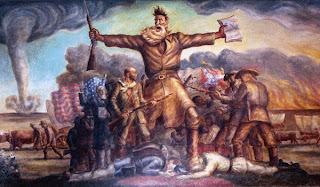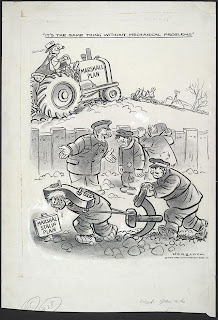APUSH Gang,
If you're reading this, you've found my blog...congratulations! This is where you can expect to find your weekly assignments, nuggets of my wisdom, and just generally cool stuff.
This week (Aug. 29th-September 2nd), we are going to take a quick look at Britain's North American colonies prior to the American Revolution. Here's what you can expect:
1.) "American Pageant" Guidebooks, Ch. 6-8, are on my McKeel webpage and ready to be downloaded and completed. You should complete Ch. 6 & 7 this week...email your findings to me by Fri., 9/2. Start working on the Ch. 8 Guidebook over the Labor Day weekend, since you won't have anything better to do. Hee hee...
2.) You need to go to the Monterey Institute's APUSH online course (there is a link to it on my McKeel webpage) and complete the assignments for Unit 1, Chapter 3, Lesson 7-9. Here's how it works:
Lesson 7 – “Colonial Life”-View the presentation titled “Colonial Life” (Watch the entire presentation)
Topic 1 – “Origins of Slavery”
a.) Explore “Slave Ships” – click on the link to view the illustration, then answer the accompanying question
b.) Explore “The Virginia Slave Codes” – click on the link to read the Slave Codes, then answer the “Consider This” question
c.) Explore “Olaudah Equiano: A Slave Experience” – click on the link to read Equiano’s account of his experience aboard a slave ship. Then, read the five excerpts from Equiano's autobiography that were given to you in class on 8/30...
As you read all five excerpts, highlight evidence that shows the emotions and physical senses that Equiano felt during his journey across the Atlantic. Then, look up what happened on the slave ship named
Zong. Due Tues., 9/6.
Topic 2 – “Diversity”
a.) Explore “Regional Imports and Exports” – click on the link to view the illustration, then answer the accompanying question
Topic 3 – “Family and Social Life”
a.) Explore the “Charter of Rhode Island and Providence Plantations, 1663” – click on the link and answer the multiple-choice question
-Follow this same routine/list of assignments for Lesson 8 (“Scientific and Religious Transformations”) & Lesson 9 (“The French & Indian War”). These are due on Friday, 9/2.
3.) Answer the following Free-Response question from the 2001 APUSH end-of-the-year exam: “How did economic, geographic, and social factors encourage the growth of slavery as an important part of the economy of the southern colonies from 1607 to 1775?” You may turn this in as a Word document, handwrite your answer, or email your response to me by Thursday, 9/1.
4.) On the Monterey Institute's website, when you click on Unit 1, Chapter 3, the menu that appears to the right side of your screen includes the following: "Writing Assignment Chapter 3 – American Society Takes Shape”
-Read the two documents, then answer the questions at the end of the exercise. This is due by Wed., 8/31
5.) Answer the following question as a response on this blog. It should be well-thought-out and planned, and should contain at least 300 words. This should be posted on my blog by Thurs., 9/1.
Question - "How did the economic system of the British North American colonies affect the lives of those who lived there? Did it create different groups of 'winners' and 'losers'?"
6.) Be prepared to write your first DBQ of the year this week. It will be a comparison of the Chesapeake and New England colonies. We will go over the documents in class, but you will write the essay on your own time.
7.) This week, you will need to read Chapter 3 of Dr. Zinn's "A People's History of the United States." This chapter is entitled "Persons of Mean & Vile Condition." As you read, write a one-page precis; when you finish the chapter, answer the following:
a.) Why does Zinn choose this title for chapter 3?
b.) Do you agree with his thesis in this chapter? (for this question, it would help if you identify the thesis first) Why or why not?
c.) What would be a good alternative title for this chapter? Why did you choose this?
d.) In light of the primary documents that we viewed in class on Tues., 8/30 (in defense of indentured servitude in the Chesapeake region, and the court proceeding in Virginia in 1640), and in the context of 17th-century strife between landowning elites and their former servants, why did slavery become the better option to the labor question in Virginia and Maryland, and later throughout the South? What does Zinn say about this question?
This Zinn assignment is due on Tues., 9/6.
8.) The APUSH test at the end of the year is scheduled for 8AM, Friday, May 11, 2012. Unfortunately, the same day is a McKeel holiday for staff and students. You will be expected to be here for the exam; administration will open the school for us, and we will be finished by noon. Please let your parents know, even though a letter will be sent home in the next few days.










